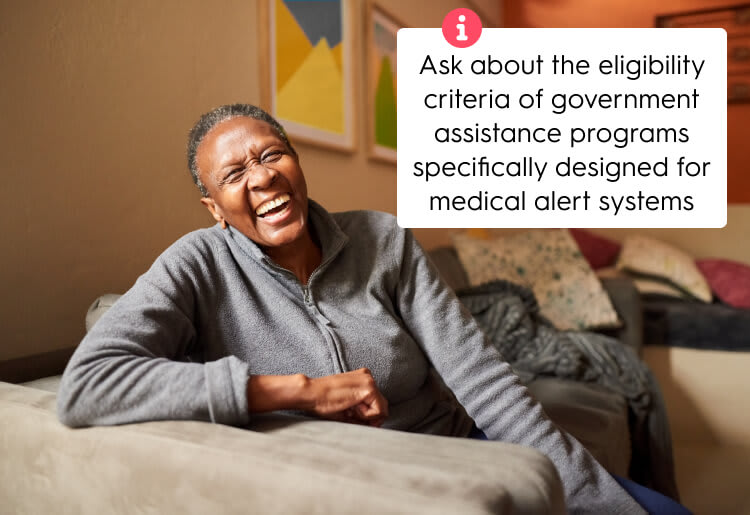A medical alert system can be a life-saving device for people at risk of falls or medical emergencies.
However, as a rehabilitation specialist, I've found that monthly fees often make these devices unattainable for elderly patients. Luckily, there are ways to get medical alert systems for free, or for a reduced price.
» These are the ten key benefits of medical alert systems for seniors.
How to Save on a Medical Alert System
There are various ways to save on a medical alert system, including:
Local Assistance Programs
Reach out to community resources like local health departments and senior centers. These places are great sources of information about available medical alert systems.
For instance, you can reach out to your local Area Agency on Aging to explore nearby support options. Certain centers offer scholarships specifically for older adults who require medical alert devices.
Take a moment to check the eligibility criteria—do these programs provide special preferences or benefits for seniors, or are they open to everyone? This will help you determine if you qualify.
Government Assistance Programs
Ask about the eligibility criteria of government assistance programs specifically designed for medical alert systems. They often favor veterans and seniors and can potentially reduce or eliminate costs.
For example, veterans can receive medical alert devices through the VA, but you need to use a vendor approved by the VA.
Timing Your Purchase
Keep your eyes peeled for deals during seasonal sales like Black Friday, Christmas, New Year, and other occasions. Timing your medical alert system purchase during these periods could open the door to significant cost savings.
Negotiate and Look Out for Discounts
Talking to insurance providers about lowering costs is another option to explore. Consider the discounts that come with annual plans or check out bundled services such as quarterly or bimonthly options.

Consider DIY Alternatives
The do-it-yourself (DIY) alternative involves relying on yourself or getting help from someone nearby. This might mean setting alarms, reminders, or having a companion, especially for older individuals who may tend to wander. For example, having a dog to guide you home can be helpful.
Additionally, consider using medication reminders and keep in mind that some iOS devices offer fall detection features, automatically alerting emergency services. These DIY methods don't require investing in a medical alert subscription plan, providing budget-friendly solutions for seniors or anyone with a tight budget.
» Check out these Life Alert alternatives for more options.
Maintaining Your Medical Alert System
Like any high-tech gadget, correctly maintaining your medical alert system is crucial.
- Follow the manufacturer's instructions at all times, and if you ever run into a hiccup, contact customer service for accurate and helpful guidance.
- Whenever your device is not in use, take a moment to replace or remove the battery. This can help to prevent any unwanted surprises like corrosion.
- Be cautious with water exposure even if the device is waterproof—avoid submerging it and limit exposure to accidental splashes.
- Store the device away from direct sunlight or extreme conditions to ensure its longevity.
» Learn how medical alert systems work so you can make the most of them.
Why Medical Alert Affordability Is So Important
For those at risk of falls or needing monitoring, these devices provide extra assurance, so they should ideally be available to all who need them, regardless of financial status. No one should have to choose between getting lifesaving support and making ends meet.
What's more, finding ways to make alert systems affordable for all fosters a spirit of caring community. It sends the uplifting message that everyone deserves access to technology that can keep them safe as they age with dignity.
Even a monthly rate of just $20 could be manageable for those on tight budgets while still sustaining an inclusive business model.
Tips to Make an Informed Decision
Finding the right medical alert system doesn't have to be overwhelming. Here are some proactive tips to guide you through this decision-making process:
Assess Your Specific Needs
Understand whether you require features like fall detection or a GPS tracker and identify which medical alert systems offer these features and at what cost. The latest generation of medical alert devices even come with water-resistant properties so you can take them anywhere.
Explore Cheaper Alternatives
Before finalizing a decision, consider exploring more affordable alternatives that still meet your essential requirements.
Rely on Unbiased Customer Reviews
Expand your research beyond company-affiliated reviews. Look for unbiased customer reviews on various platforms to gain a more balanced perspective.
Take Advantage of Trial Periods
Prioritize medical alert system providers that offer a trial period. This allows you to test the system and verify if it meets your expectations.
Inclusive Aging Solutions
Making medical alert systems accessible is about striking a balance between safety and budget, ensuring everyone has the opportunity to age in place with dignity and security. Whether it is medical alert bracelets or medical alert buttons, they can give you a greater sense of independence.
Use these cost-saving strategies to find an accessible medical alert system for your needs. If you see signs your loved one needs a medical device, or maybe you're looking for yourself, then you should definitely look into the top medical alert necklace of 2025.
» Follow these tips to choose the best medical alert system for your lifestyle.

